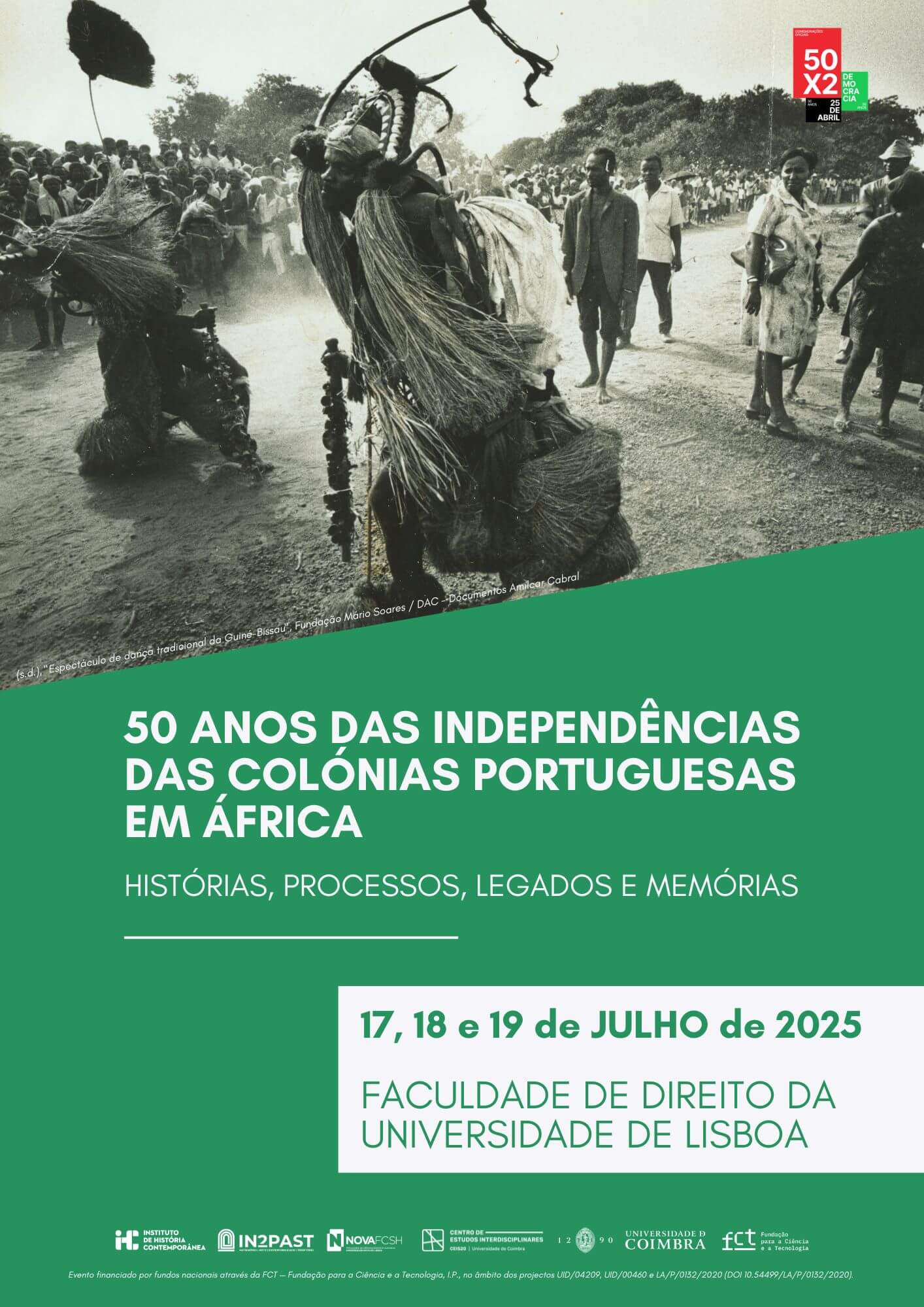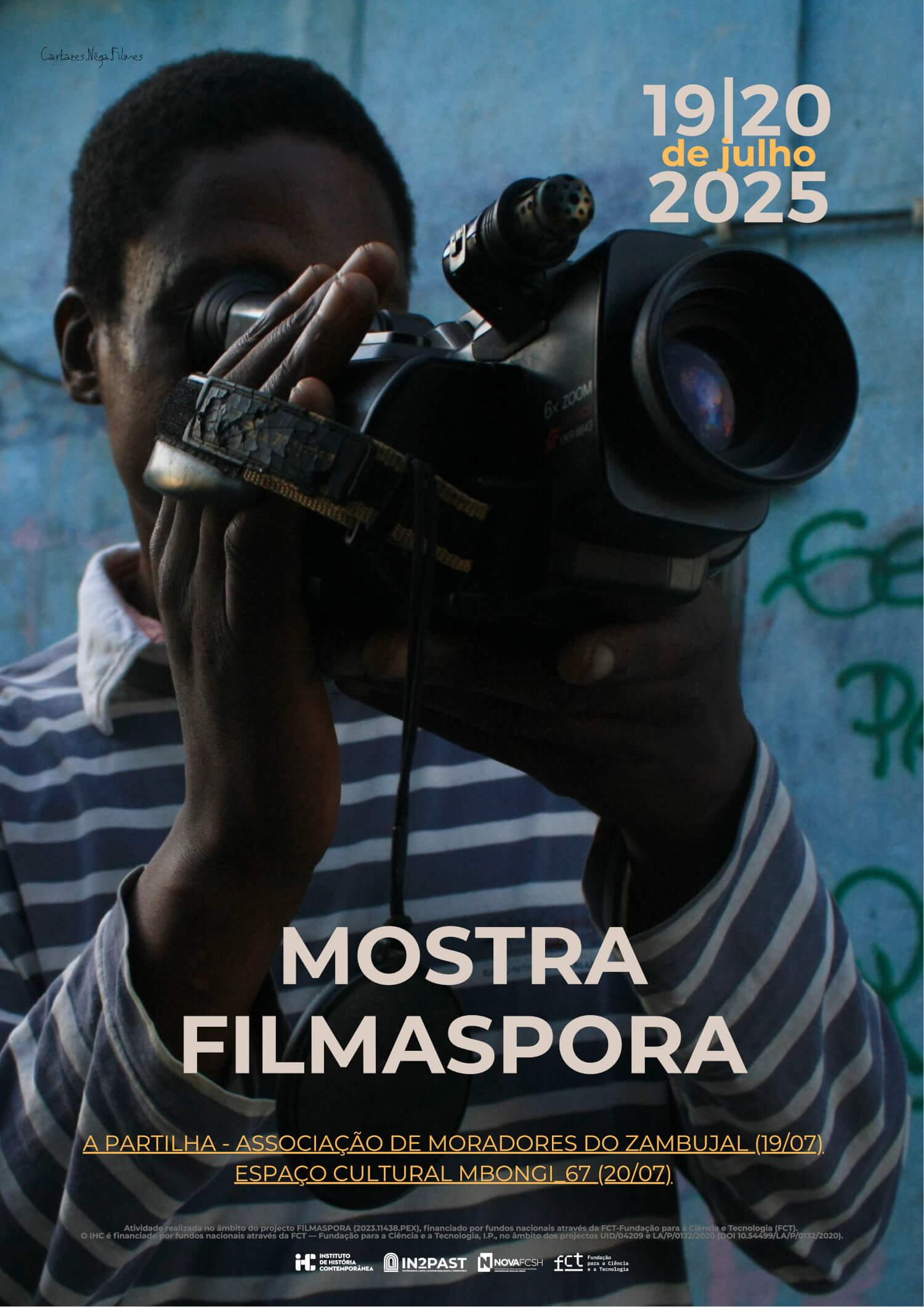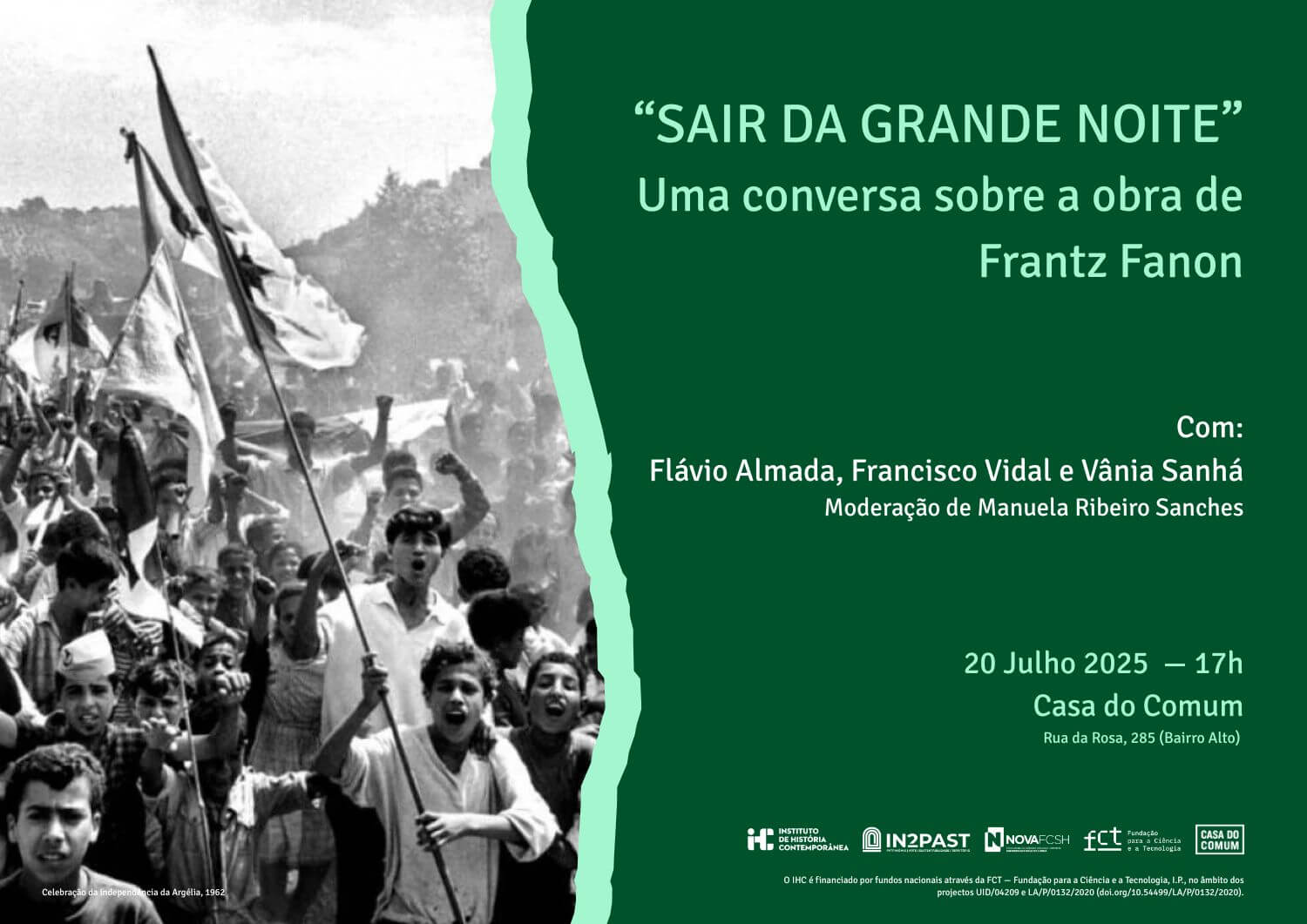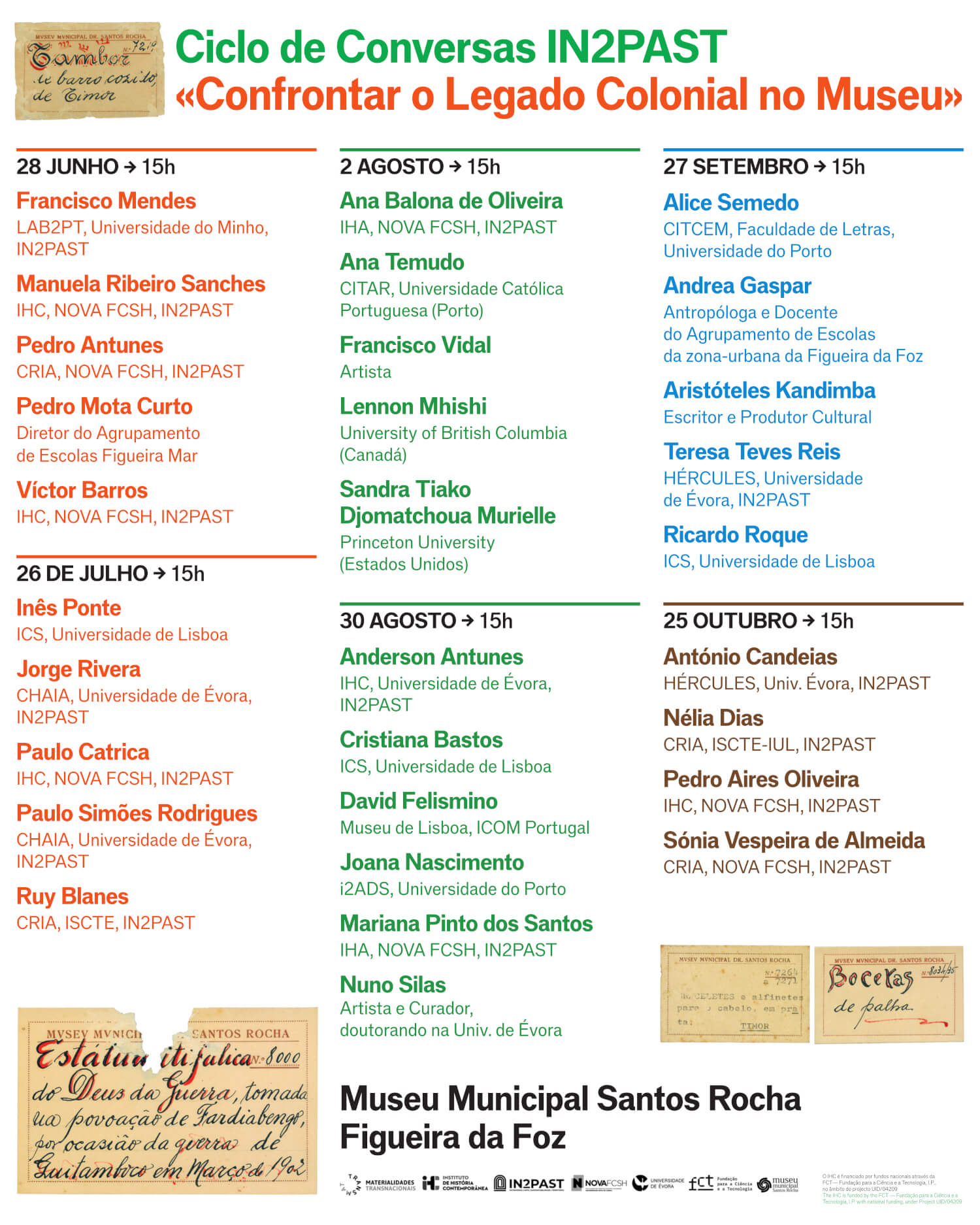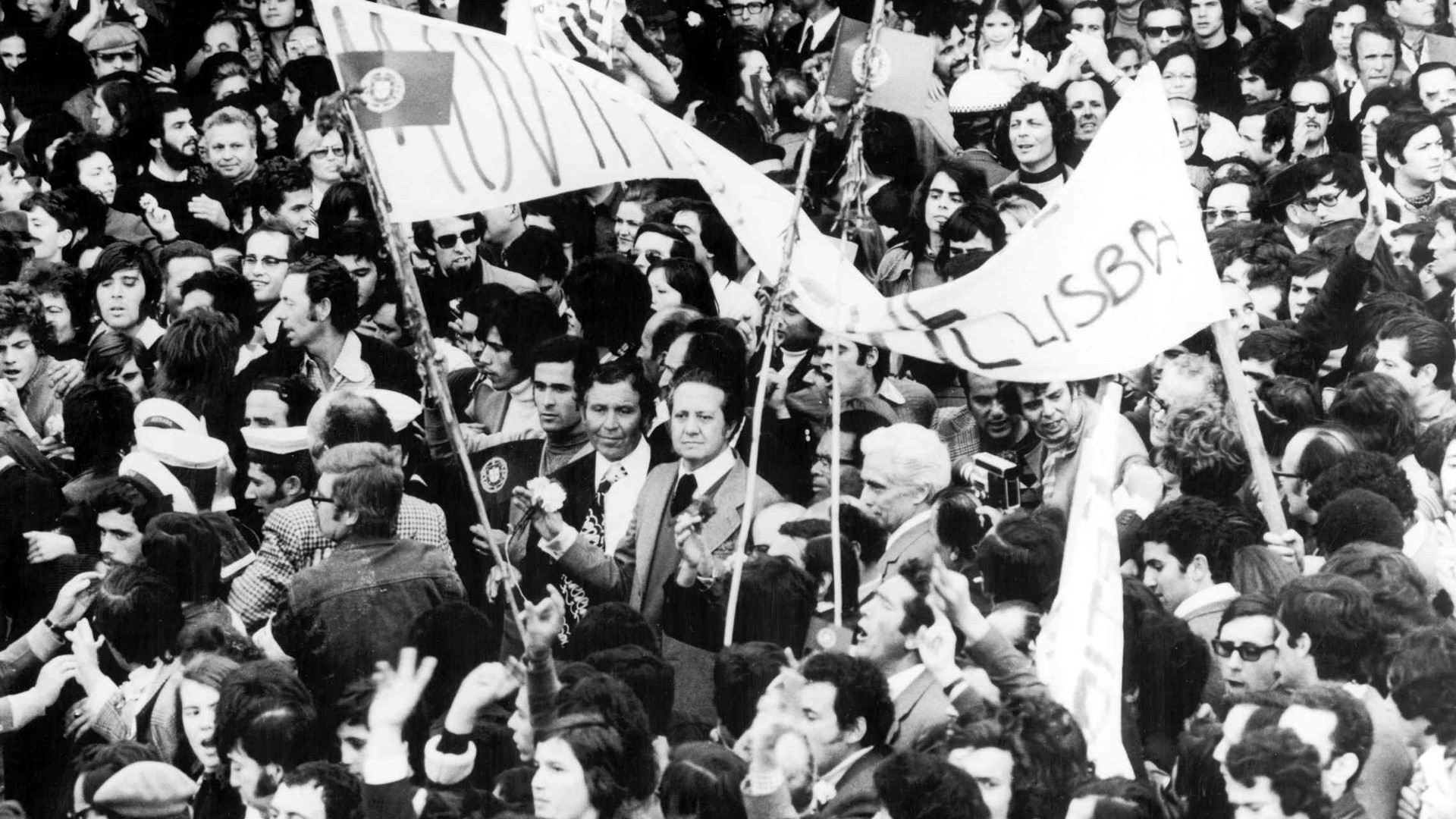
Ricardo Noronha leads team to study “petromodernity”
The PETROSINES project was one of the six History projects that received funding from the FCT
VINCULUM recognised with European Union Prize for Citizen Science
VINCULUM’s application received an Honourable Mention in the European Union Prize for Citizen Science 2025
News
-
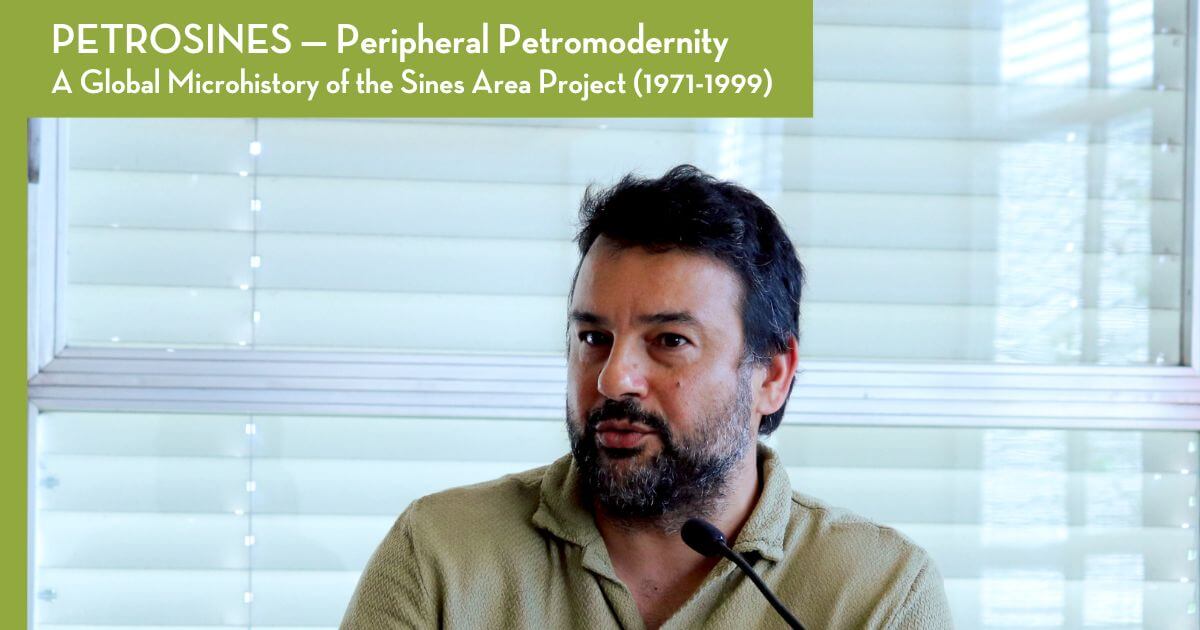 The PETROSINES project was one of the six History projects that received funding from the FCT
The PETROSINES project was one of the six History projects that received funding from the FCT -
 Statement from the team of the project FILMASPORA
Statement from the team of the project FILMASPORA -
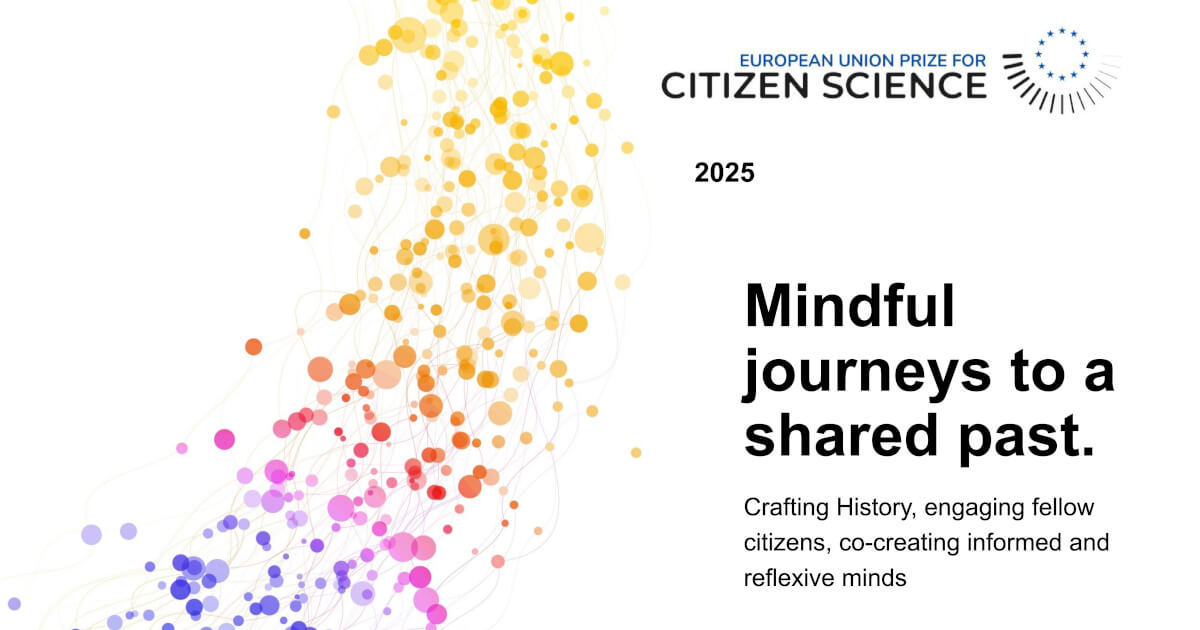 VINCULUM's application received an Honourable Mention in the European Union Prize for Citizen Science 2025
VINCULUM's application received an Honourable Mention in the European Union Prize for Citizen Science 2025 -
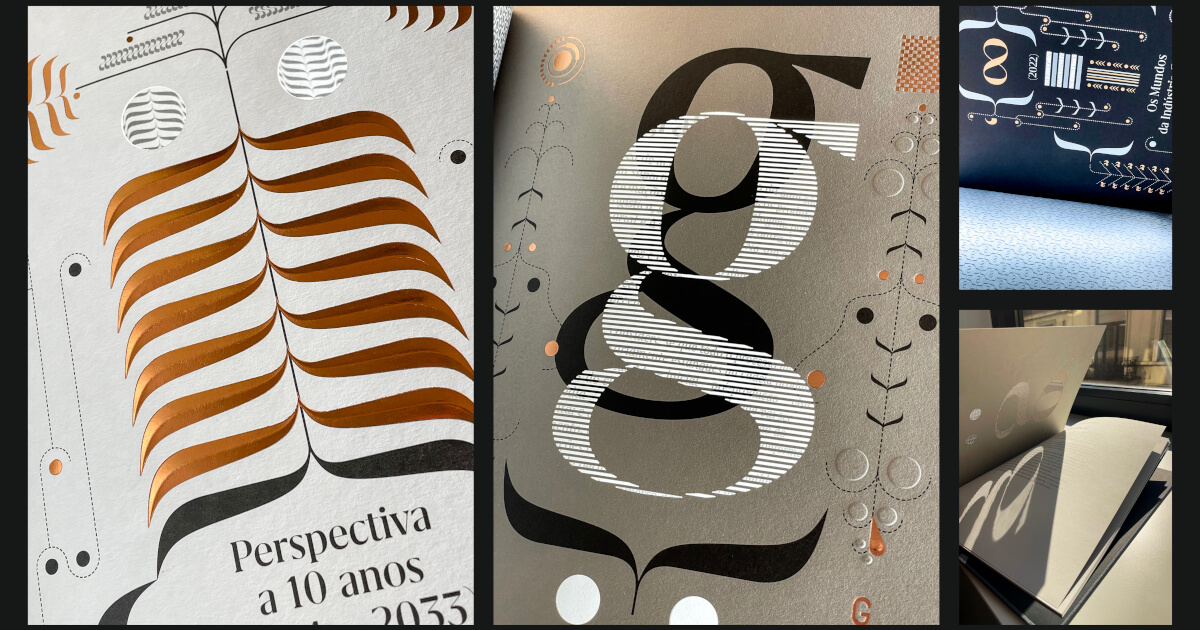 The book on the history of the national printing industry was the Gold Winner in the Editorial Design —...
The book on the history of the national printing industry was the Gold Winner in the Editorial Design —... -
 The paper by Quintino Lopes, Francisco de Lacerda, and Ana Simões, was the 2025 winner.
The paper by Quintino Lopes, Francisco de Lacerda, and Ana Simões, was the 2025 winner. -
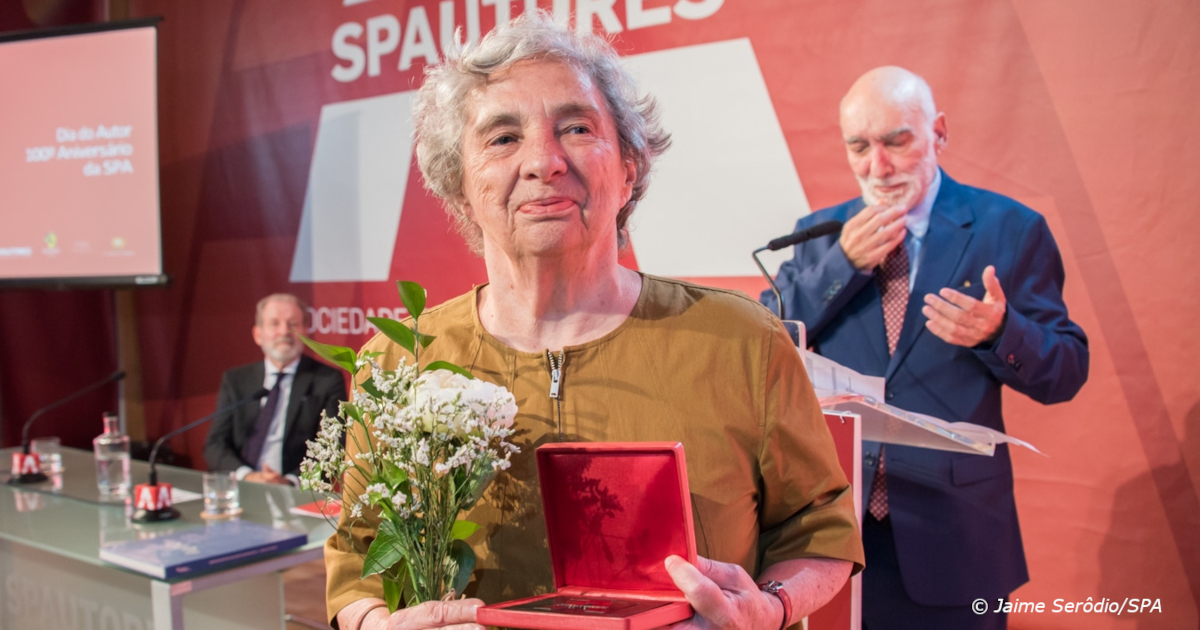 Irene Flunser Pimentel was one of the personalities honoured ‘for her outstanding contribution to culture’.
Irene Flunser Pimentel was one of the personalities honoured ‘for her outstanding contribution to culture’. -
 Miguel Carmo and José Filipe Costa worked on the film ‘I Only Rest in the Storm’
Miguel Carmo and José Filipe Costa worked on the film ‘I Only Rest in the Storm’ -
 ‘Angola: Saberes em movimento’ at the Frei Manuel do Cenáculo National Museum
‘Angola: Saberes em movimento’ at the Frei Manuel do Cenáculo National Museum -
 The PhD thesis was awarded the Francisco Canais Rocha Prize for studies on the labour movement
The PhD thesis was awarded the Francisco Canais Rocha Prize for studies on the labour movement -
 Catarina Laranjeiro and Inês Vieira Gomes are the curators of the exhibition
Catarina Laranjeiro and Inês Vieira Gomes are the curators of the exhibition -
 The first fiction feature by José Filipe Costa will be premiered in Portugal at the Indie Lisboa
The first fiction feature by José Filipe Costa will be premiered in Portugal at the Indie Lisboa -
 'Before Being Independence, It Was a Struggle For Liberation' recently opened
'Before Being Independence, It Was a Struggle For Liberation' recently opened -
 Civil Society Forum on Combating Antisemitism and Fostering Jewish Life
Civil Society Forum on Combating Antisemitism and Fostering Jewish Life -
 Joana Dias Pereira is a member of IFPH's Steering Committee
Joana Dias Pereira is a member of IFPH's Steering Committee -
 SMS — Shared Memories of Solidarity was selected for funding by the FCT
SMS — Shared Memories of Solidarity was selected for funding by the FCT -
 Community on the Zenodo platform, EU Open Research Repository, and a set of books on OAPEN
Community on the Zenodo platform, EU Open Research Repository, and a set of books on OAPEN -
 Collaborative museology with Kanawayuri Marcello Kamaiurá and Auakamu Kamayurá
Collaborative museology with Kanawayuri Marcello Kamaiurá and Auakamu Kamayurá -
 Eça de Queirós in Egypt and the Opening of the Suez Canal
Eça de Queirós in Egypt and the Opening of the Suez Canal -
 Conference and exhibition at the Santos Rocha Municipal Museum, Figueira da Foz
Conference and exhibition at the Santos Rocha Municipal Museum, Figueira da Foz -
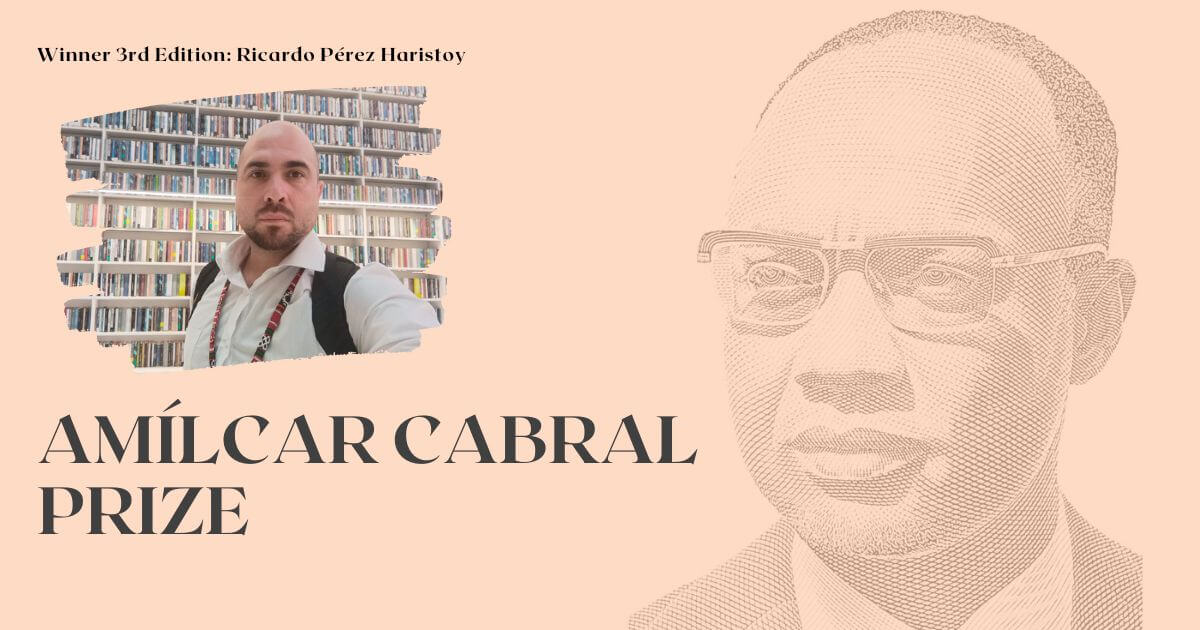 The winner of the Amílcar Cabral Prize will be in Lisbon next week
The winner of the Amílcar Cabral Prize will be in Lisbon next week
Events
july, 2025
Event Type :
All
All
Colloquium
Conference
Conference
Congress
Course
Cycle
Debate
Exhibition
Launch
Lecture
Meeting
Movie session
Open calls
Opening
Other
Presentation
Round table
Seminar
Showcase
Symposium
Tour
Workshop
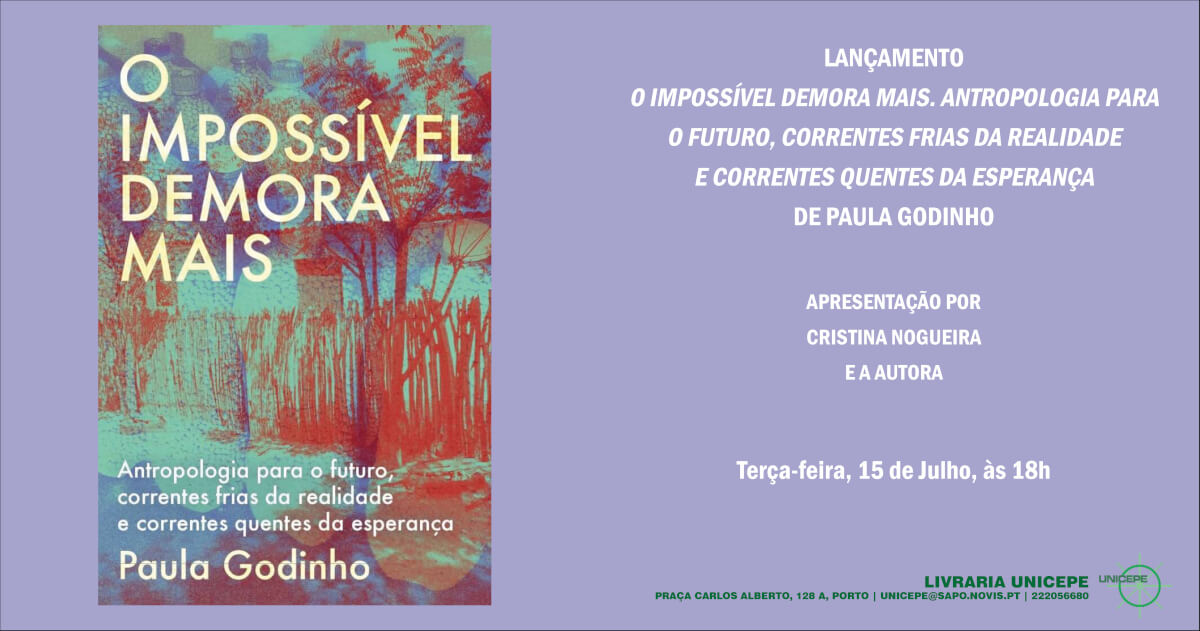
Event Details
Paula Godinho‘s new book will also be launched in Porto, at the UNICEPE bookshop, with a presentation by Cristina Nogueira. O
more
Event Details
Paula Godinho‘s new book will also be launched in Porto, at the UNICEPE bookshop, with a presentation by Cristina Nogueira.
O Impossível Demora Mais
Antropologia para o futuro, correntes frias da realidade e correntes quentes da esperança
Nada há de normal ou natural no desvanecimento da esperança. Neste livro, a autora parte da realidade atual da grã-crise para ensaiar uma crítica aos princípios que ordenam o tempo, entre o que pode acontecer, desacontecer e reacontecer. Os futuros desafiam-se, e a memória pode ser um terraço para outra coisa ainda, para escapar ao provável, apresentado como uma condenação. A construção do possível e mesmo do impossível remete para etnografias da resistência, em lugares concretos e entre pessoas concretas, com recurso a subjetivações libertadoras. Procuram-se fulgores que trazem dentro o jogo, a brincadeira e a festa, como invenção de mundos por vir, que poderão servir de tocha para esboroar incertezas e esboçar uma teoria das disputas do futuro, entre qualidades do tempo, rastos que são também rastilhos, rumos para a ação coletiva, esperança que é verbo e construção, prática e concretização. Finalmente, traz dentro a pressa que se põe num remate acerca do impossível, que é necessário.
Mais informações sobre o livro
Time
(Tuesday) 6:00 pm - 7:00 pm
Organizer
Tigre de Papel Press and UNICEPE Cooperative
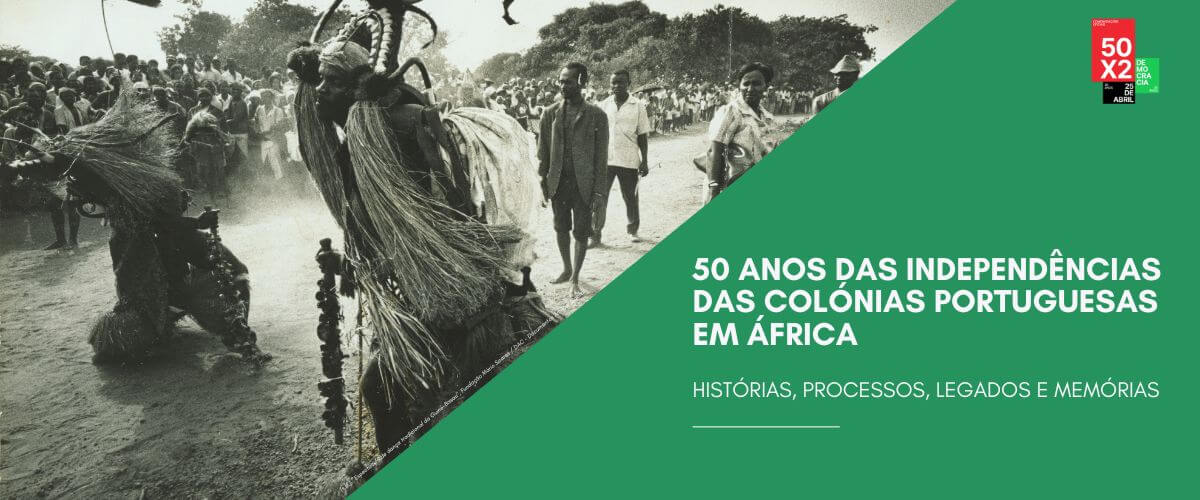
Event Details
On the multiple dimensions – histories, processes, actions, memories and postcolonial legacies – of these independences that changed the configuration of global politics in the second half of the 20th
more
Event Details
On the multiple dimensions – histories, processes, actions, memories and postcolonial legacies – of these independences that changed the configuration of global politics in the second half of the 20th century.
50 Years of the Independence of Portuguese Colonies in Africa:
Processes, Legacies and Memories
In 2025, four former Portuguese colonies in Africa (Angola, Cape Verde, Mozambique, São Tomé and Príncipe) will celebrate the 50 th anniversary of their independence, joining Guinea-Bissau which, two years earlier (in September 1973), had unilaterally proclaimed the state of Guinea, formally accessing independence on September 10, 1974. In fact, the complex negotiation processes that opened the door to independence of these territories that had been dominated by Portugal for centuries were not straightforward. Thus, from the Unilateral Declaration of Independence of Guinea (an important precedent at international level) to the opening of negotiation processes in the cases of Angola, Cape Verde, Mozambique and São Tomé and Príncipe complex and important geopolitical and transnational webs were established, in the African and global context of the Cold War and the aftermath of the Sino-Soviet split, which are worth analysing.
The aim of this International Conference is to mark the 50 th anniversary of these transcendental events for the lives of African territories once colonized by Portugal, some of whom (Guinea-Bissau, Angola and Mozambique) endured devastating liberation wars/colonial wars. These struggles for emancipation are part of a long history of resistance by the peoples subjected to imperial exploitation, forced labour, racism and colonialism. As it is well known, the processes that led to independence generated multiple dynamics and ramifications which, on the one hand, went beyond the main borders of each territory; on the other, produced internal and external interactions, with various elements and constraints, combining the international context of the time with internal demands for political sovereignty by the colonized peoples.
In this sense, independence should not be interpreted as an isolated historical event, nor as a linear and homogeneous event. There is a specific historicity that characterizes independence processes in each of the territories, processes that are marked by several and diverse complexities. So much so that we cannot separate independence from the struggles of the liberation movements, anti-colonialism, the revolutions in the Third World, anti-imperialism and the struggle against dictatorship and fascism in Portugal. In short, independence resulted from various struggles carried out by the liberation movements on different fronts. Their actions also contributed to the Revolution of April 25, 1974, and, consequently, to the fall of the fascist dictatorship in Portugal.
Call for Papers
After 50 years of these historical events that led to the emergence of new nation-states, this international conference aims to reflect on the multiple dimensions – histories, processes, actions, memories and postcolonial legacies – of these independences that changed the configuration of global politics in the second half of the 20th century. As such, proposals are invited for contributions on topics such as:
- Independence struggles (concepts, political, cultural and social contexts);
- Independence struggles, anti-colonialism, anti-imperialism and Third World revolutions;
- International solidarity with the former Portuguese colonies and intersections with other anticolonial struggles in the context of the Cold War;
- Actors, activists and independentist organizations;
- Gender, education and popular mobilization in the struggles for independence;
- Arts, artivism and cultural manifestations in the struggles for independence;
- Contribution from independence struggles to the fall of Portuguese dictatorship;
- Decolonization after 25 April 1974;
- Building new African nation-states and neo-colonialism;
- Colonial legacies in independent African countries and Portugal;
- Civil wars and democratic transition in independent African countries;
- The construction of memory in independent African countries and Portugal.
Abstracts for presentations (200 words) and a biographical note (250 words) should be sent to the following email: independencias50anos@gmail.com
Deadline for submissions: 15 December 2024
Notification of acceptance: 30 January 2025
Conference languages: Portuguese, English and French
>> Download the call for papers (PT / FR / EN, PDF) <<
Keynote speakers:
Maria da Conceição Neto (Universidade Agostinho Neto)
Severino Elias Ngoenha (Universidade Eduardo Mondlane)
Organisingg Committee:
Aurora Almada e Santos (IHC — NOVA FCSH / IN2PAST)
Julião Soares Sousa (CEIS 20 — Universidade de Coimbra)
Raquel Ribeiro (IHC — NOVA FCSH / IN2PAST)
Víctor Barros (IHC — NOVA FCSH / IN2PAST)
Scientific Committee:
Gabriel Fernandes (Universidade de Santiago)
Jean Martial Arséne Mbah (Investigador, Doutorado em História Contemporânea)
Jean-Michel Mabeko-Tali (Howard University)
Marçal de Menezes Paredes (Pontifícia Universidade Católica do Rio Grande do Sul)
Maria Nazaré de Ceita (Universidade de São Tomé)
Michel Cahen (Sciences Po Bordeaux)
Miguel Cardina (Universidade de Coimbra)
Odete Semedo (Instituto Nacional de Estudos e Pesquisa, Guiné-Bissau)
Pedro Aires Oliveira (IHC — NOVA FCSH / IN2PAST)
Teresa Cruz e Silva (Universidade Eduardo Mondlane)
Time
july 17 (Thursday) - 19 (Saturday)
Location
University of Lisbon School of Law
Alameda da Universidade — Cidade Universitária — 1649-014 Lisbon
Organizer
Institute of Contemporary History — NOVA School of Social Sciences and Humanities and CEIS20 - Centre for Interdisciplinary Studies — University of Coimbra
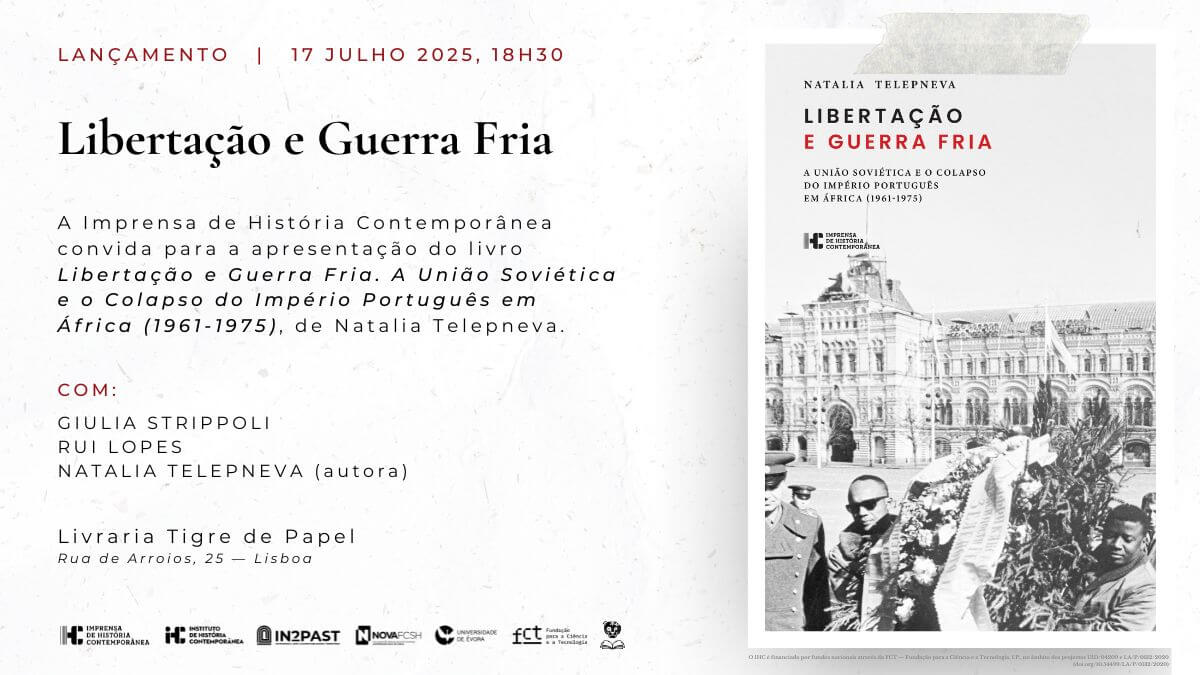
Event Details
Launch of the third book of the series Trânsitos of the Imprensa de História Contemporânea, authored by Natalia
more
Event Details
Launch of the third book of the series Trânsitos of the Imprensa de História Contemporânea, authored by Natalia Telpneva.
Libertação e Guerra Fria
A União Soviética e o Colapso do Império Português em África (1961-1975)
O livro será lançado, com a presença da autora, Natalia Telpneva, e apresentação por Giulia Strippoli e Rui Lopes.
Sobre o livro:
Este livro estuda os revolucionários africanos que lideraram lutas armadas em três colónias portuguesas — Angola, Moçambique e Guiné-Bissau — e as suas ligações a Moscovo, Praga, Berlim Oriental e Sófia. Ao reconstruir uma história multidimensional que se concentra tanto no impacto da União Soviética no fim do Império Português em África como no efeito das lutas anti-coloniais na União Soviética, Natalia Telepneva preenche uma importante lacuna na história dos movimentos anti-coloniais e das rivalidades da Guerra Fria na África Subsariana. Com base em fontes arquivísticas recentemente disponibilizadas na Rússia e na Europa Oriental e num conjunto de entrevistas, a autora enfatiza a agência dos líderes da libertação africana através das suas relações com membros de nível médio da burocracia soviética. Reinterpretação inovadora das relações forjadas entre os revolucionários africanos e os países do Pacto de Varsóvia, Libertação e Guerra Fria: A União Soviética e o colapso do império português em África (1961-1975) é uma contribuição fundamental para os debates sobre as políticas em jogo no Sul Global durante a Guerra Fria.
Sobre a autora:
Natalia Telpneva é professora de História Internacional na Universidade de Strathclyde (Glasgow). Os seus interesses de investigação incluem a história da União Soviética e da Guerra Fria e a história do socialismo, especialmente em África. Presentemente trabalha sobre as relações militares soviéticas com o continente africano.
Time
(Thursday) 6:30 pm - 8:00 pm
Location
Livraria Tigre de Papel
Organizer
IHC Press and Tigre de Papel Bookstore
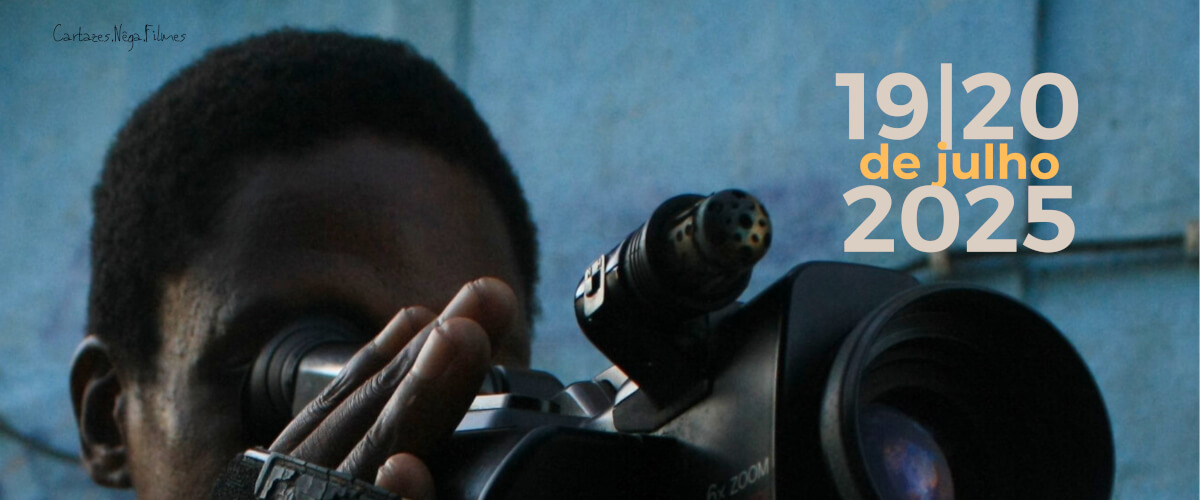
Event Details
A film exhibition organised by the FILMASPORA project, which promotes an encounter between productions arising from the Sintra area and works made in the Bairro do
more
Event Details
A film exhibition organised by the FILMASPORA project, which promotes an encounter between productions arising from the Sintra area and works made in the Bairro do Zambujal.
Mostra FILMASPORA
Nos dias 19 e 20 de Julho, a equipa do projecto FILMASPORA organiza uma mostra de filmes que promove o encontro entre produções da Linha de Sintra e obras realizadas no Bairro do Zambujal.
Junte-se a nós para dois dias de diálogo, partilha e cinema.
O projeto FILMASPORA tem como objectivo fomentar o intercâmbio cultural e audiovisual, aproximando comunidades através da exibição de curtas e médias-metragens que dão voz às vivências, expressões e narrativas locais.
Programa
19 de Julho
A Partilha — Associação de Moradores do Bairro do Zambujal, Loures, 21h
21h – HIP-HOP KRIOLO
21h30 – Enciclopédia Hip Hop Volume 1 (2016), de Uncle C
20 de Julho
Espaço Mbongi 67, Linha de Sintra, 16h
16h – Lisboa, Pódio de Quimeras (2021), de Welket bungué
16h30 – Cantores do Submundo (2012), de Fernando Moreira
>> Programa da mostra (PDF) <<
Time
19 (Saturday) 9:00 pm - 20 (Sunday) 6:00 pm
Location
Loures and Sintra
Organizer
Institute of Contemporary History — NOVA School of Social Sciences and Humanitiescomunicacao.ihc@fcsh.unl.pt Avenida de Berna, 26C - 1069-061 Lisbon
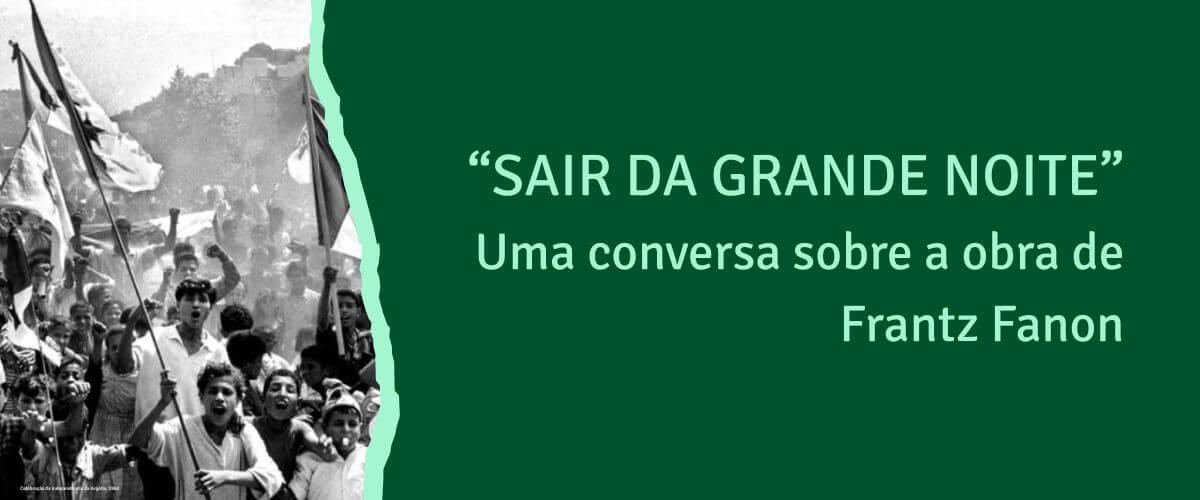
Event Details
On the centenary of Frantz Fanon's birth, this is a preview of the cycle, which will take place in 2026, around the relationship between his work and cinema. "Sair
more
Event Details
On the centenary of Frantz Fanon’s birth, this is a preview of the cycle, which will take place in 2026, around the relationship between his work and cinema.
“Sair da Grande Noite”
Uma conversa sobre a obra de Frantz Fanon
Uma conversa sobre a obra de Frantz Fanon por ocasião do 100º aniversário do seu nascimento, com a presença de Flávio Almada, Francisco Vidal, Vânia Sanhá e moderação de Manuela Ribeiro Sanches.
Frantz Fanon é hoje uma referência incontornável em vários contextos políticos e sociais um pouco por todo o mundo, sendo a sua presença uma constante nos movimentos anti-racistas e nos debates sobre os legados do colonialismo, nomeadamente no que diz respeito à distribuição de poder a nível global. Mais recentemente, a actividade de Fanon enquanto psiquiatra tem conhecido maior divulgação e o elemento terapêutico no seu pensamento ganhou relevo. Em Portugal, este interesse tem sido acompanhado por novas edições da sua obra.
A leitura de Fanon revela-se fundamental não só para a compreensão do contexto histórico em que surgiu, com as suas ramificações entre os movimentos de libertação e as causas do chamado Terceiro Mundo nas décadas de 1960 e 1970, mas também e, agora, sobretudo na luta pelos direitos de grupos racializados. Com efeito, todas estas questões voltam a ecoar no século XXI, quer em movimentos sociais que reivindicam uma cidadania efectivamente igualitária, quer na discussão sobre a urgência da descolonização de saberes e instituições.
Como ler Fanon, hoje, a partir de Portugal? Qual o papel das instituições e dos diferentes movimentos na sua recepção? Qual a relevância da sua obra para a nossa contemporaneidade, tendo em conta a complexidade das suas diferentes vertentes – anti-colonial, anti-racista, terapêutica – e a reivindicação para se “sair da grande noite” do colonialismo? É em torno destes temas que se propõe uma conversa que dá o mote à iniciativa associada ao centésimo aniversário do nascimento de Fanon, a decorrer entre Janeiro e Fevereiro de 2026, através de um ciclo sobre as relações entre a sua obra e o cinema.
ENTRADA LIVRE
Time
(Sunday) 5:00 pm - 7:00 pm
Organizer
Institute of Contemporary History — NOVA School of Social Sciences and Humanities and Casa do Comum
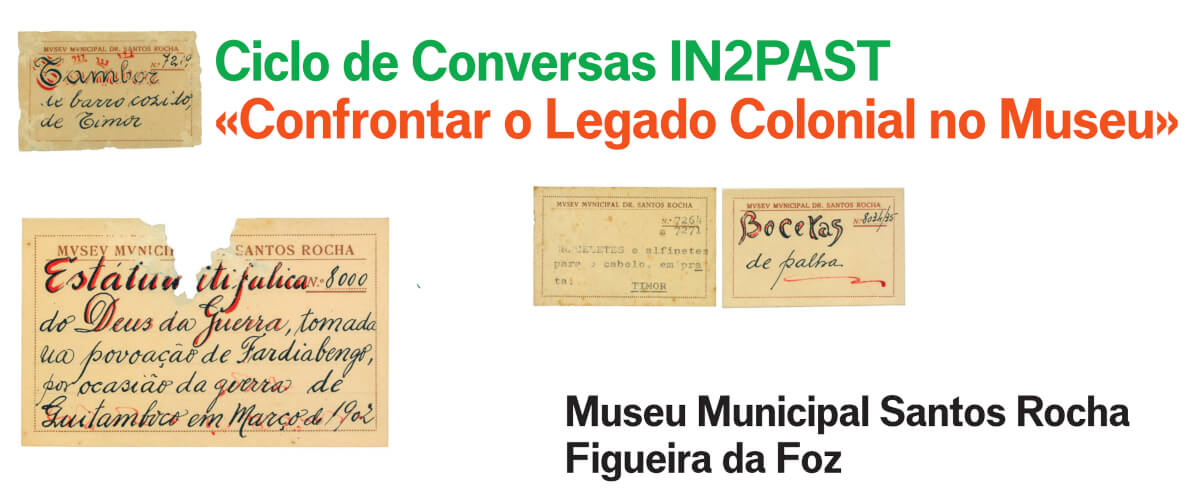
Event Details
A series of debates organised as part of the TRANSMAT project, the aim of which is to critically reflect on the colonial legacy in Portuguese museums.
more
Event Details
A series of debates organised as part of the TRANSMAT project, the aim of which is to critically reflect on the colonial legacy in Portuguese museums.
Confrontar o Legado Colonial no Museu
Entre Junho e Outubro de 2025, o Museu Municipal Santos Rocha, na Figueira da Foz, será palco do ciclo de conversas Confrontar o Legado Colonial no Museu, uma iniciativa promovida pelo projecto TRANSMAT em parceria com o Museu Municipal Santos Rocha que reúne vozes diversas para reflectir criticamente sobre o legado colonial nos museus portugueses.
Ao longo de seis sessões, investigadores/as, artistas, curadores/as, escritores/as, docentes e outras personalidades convidam o público a participar num debate plural e aberto sobre memória, património e identidade. As sessões vão contar com a participação activa de personalidades locais, como Pedro Mota Curto (Diretor do Agrupamento de Escolas Figueira Mar) e Andrea Gaspar (Antropóloga e docente do Agrupamento de escolas zona urbana da Figueira da Foz), reforçando o envolvimento da comunidade da Figueira da Foz neste debate fundamental. Artistas como Francisco Vidal e Nuno Silas trazem o olhar das artes visuais para o centro da discussão, enriquecendo a troca de experiências e saberes. Contamos igualmente com a participação de Aristóteles Kandimba, escritor, investigador, produtor e fundador do Colectivo Tributo aos Ancestrais PT, cujo contributo tem sido fundamental no resgate e valorização das memórias e culturas afro-descendentes em Portugal.
Participe e faça parte desta reflexão colectiva sobre património, memória e transformação social na Figueira da Foz.
>> Descarregar o programa (PDF) <<
Segunda sessão:
Inês Ponte (ICS — Universidade de Lisboa)
Jorge Rivera (CHAIA — Universidade de Évora / IN2PAST)
Paulo Catrica (IHC — NOVA FCSH / IN2PAST)
Paulo Simões Rodrigues (CHAIA — Universidade de Évora / IN2PAST)
Ruy Blanes (CRIA — ISCTE / IN2PAST)
Time
(Saturday) 3:00 pm - 5:00 pm
Organizer
Institute of Contemporary History — University of Évora and the Santos Rocha Municipal Museum
Publications

Review of ‘Women’s History at the Cutting Edge’
Giulia Strippoli writes a critical review of the book Women’s History at the Cutting Edge, edited by Teresa Bertilotti, on women’s history.

Review of ‘Subterranean Fanon’
Manuela Ribeiro Sanches writes a critical review of the book Subterranean Fanon, by Gavin Arnall, on Frantz Fanon.

On the debates on populism
Paper by Fernando Dores Costa, published in the journal Práticas da História, where he analyses the phenomenon of populism.

Administrar para manter o regime
Chapter by Ana Carina Azevedo, included in the book Construção do Estado, Movimentos Sociais e Economia Política, about public administration reform.

A era dos congressos
Chapter by Joana Dias Pereira, included in the book Construção do Estado, Movimentos Sociais e Economia Política, about the associative movement and liberalism.

Construção do Estado, Movimentos Sociais e Economia Política
Book coordinated by Joana Dias Pereira et al. about the processes of construction of the Contemporary State and its articulation with social movements.
Search
News
Ricardo Noronha leads team to study “petromodernity”
Jul 7, 2025
The PETROSINES project was one of the six History projects that received funding from the FCT
Statement about the demolitions in the Bairro de Santa Filomena
Jul 3, 2025
Statement from the team of the project FILMASPORA
VINCULUM recognised with European Union Prize for Citizen Science
Jun 20, 2025
VINCULUM’s application received an Honourable Mention in the European Union Prize for Citizen Science 2025
Opportunities
Marie Skłodowska-Curie Postdoctoral Fellowships
Sep 10
Deadline (IHC): 1 June 2025
Postdoctoral Research Fellowship — SMS
Aug 25
Deadline: 25 August 2025

